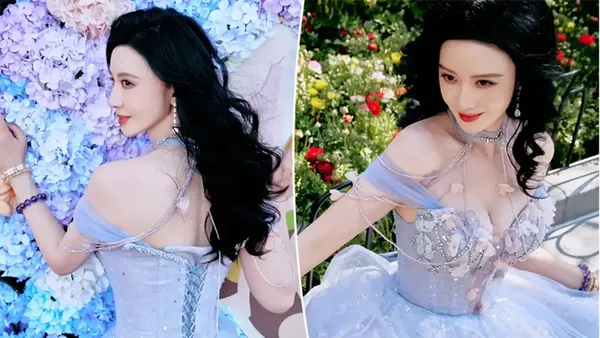The profit method of domestic dramas is too single, and the experience of "Game of Thrones" is worth learning from.
At present, the profit model of domestic dramas is relatively simple, mainly relying on domestic copyright revenue and advertising placement. In addition to injecting plots, the proliferation of product placement advertisements in domestic dramas is also a problem that has to be looked directly at.
in order to reduce costs and strive for more profits, the producers have concocted a series of "water injection dramas" and "advertising dramas", which is actually a practice of "drinking poison to quench thirst". If we want to change this vicious circle, we must change the single profit mode of domestic dramas.
original title: the profit mode of domestic dramas is too simple. What experiences can I learn from Game of Thrones?when it comes to the recent popular TV series, "the full moon blossoms that year" has to be mentioned. With its compact plot, superb acting skills and exquisite persuasion, the play scored a high score of 8.1 on Douban. Although no one denies the production of the show's conscience, some viewers disagree-the show is too long, with a total of 75 episodes, and feels a bit out of reach.
in recent years, almost all types of domestic dramas have made great progress in the number of episodes, ranging from 40 to 50 episodes to 80 or 90 episodes or even hundreds of episodes. Even some film and television works which have a good reputation and are called "conscience dramas" still have the problem of artificially lengthening the number of episodes. At the same time, the placement of advertisements in the play is also becoming more and more widespread. "Ode to Joy 2" and "late Night Canteen", which were broadcast in the first half of the year, were complained by viewers because of the excessive number of placement ads.

whether it is to lengthen the number of episodes or to plant advertisements, in the final analysis, it is for profit. But careful viewers may have found that many high-input American TV series, such as Game of Thrones, do not have ad placement or lengthening the number of episodes, why can they still make a lot of money? What are the profit methods of American TV series that can be used for reference by domestic TV dramas?
< strong > plot water injection advertisements are flooded with domestic dramas to sacrifice word of mouth for "money"? < / strong >
before it was broadcast, the publicity caliber of "the full moon in bloom that year" had always been 40 episodes. After the broadcast, the audience was surprised to find that the TV series had 75 episodes. At present, there is no sign of water injection in the plot of "the full moon in bloom that year", and the plot is more compact. But how the 40-episode script was extended to 75 episodes is really puzzling.
in the past two years, in order to pursue commercial interests, producers have deliberately lengthened the length of TV dramas, which has become a hidden rule in some industry. For example, the Book of choosing Heaven has grown from 50 episodes to 55 episodes, Chu Qiao Biography from 58 episodes to 67 episodes, and Datang Glory from 60 episodes to 92 episodes. TV dramas with 80 or 90 episodes are no longer uncommon, including 96 episodes of the Legend of Wu Mei Niang, 81 episodes of Legend of Miyue, 90 episodes of Ruyi's Royal Love in the Palace. It seems that if it does not reach more than 50 episodes, it does not deserve to be called a "TV series".

the extension of the series, if it is for the needs of the content of the series, in fact, there is no need to be demanding. However, through the extreme means of water injection, forced to lengthen the space, so that the audience can not stand it. The Legend of Chu Qiao, which was broadcast some time ago, is a "classic case" of plot water injection. The beginning of each episode will repeat a lot of the plot of the previous episode, 40 minutes of TV series, previously reviewed up to 10 minutes, so that the audience is bored.
in addition to plot water injection, the proliferation of domestic TV series placement advertisements is also a problem that we have to look directly at. "Ode to Joy 2", which was popular in the first half of the year, was ridiculed as "Ode to Advertising" because of a large number of advertisements. Careful netizens have observed that the number of advertisements in a single episode of the show is as high as 10 or more, with a minimum of 2 minutes and a maximum interval of 15 minutes. In the late Night Canteen, which aired in June, 19 brands were implanted in the ads, and many viewers said they were "disgusted" by the blunt ads in the show.
domestic dramas are seriously watered, in the final analysis, for the sake of the word "profit". According to reports, at present, TV dramas sell money according to the number of episodes, and the higher the number of episodes, the higher the income. According to industry insiders, a domestic drama with front-line actors has a basic investment of about 170 million yuan. If it is filmed for 30 episodes, the general market price is 5 million yuan per episode, and the cost can not be recovered at all. Producer Xie Xiaohu also said frankly: "in general, major investment dramas need more than 40 episodes to get their money back."
in order to reduce costs, it is understandable for producers to insert advertisements. However, in many TV dramas, serious plots and excessive advertisements have seriously affected the experience of watching TV dramas. Chuqiao Legend: Douban 5.0, Ode to Joy 2 5.3, late Night Canteen 2.8. All kinds of data can show that the producer sacrificed the reputation of the work for the sake of money, which is actually not a wise choice.
< strong > the profit model of domestic dramas depends solely on copyright revenue < / strong >
since audiences do not like the placement of advertisements and water injection scenarios, why do the producers bet on word-of-mouth again and again? This is related to the profit model of TV dramas. It is understood that there are three main ways to make money for TV dramas: copyright gains (television broadcasting rights, network broadcasting rights), advertising profits and derivatives profits.
at present, the profit model of domestic dramas is relatively simple, which mainly depends on domestic copyright revenue and advertising placement. In China, most producers only want to sell the TV play rights through distribution channels and recover the cost as soon as possible. In addition to copyright revenue, producers often can only think of advertising revenue through the placement of advertising. This has also caused the embarrassing situation of domestic drama advertisements flying indiscriminately and plot flooding.
for some TV dramas that sell well, copyright revenue and advertising placement can indeed recover the cost, or even make a lot of money. The popular "the full moon in bloom that year" completed the pre-sale long before the shooting began. Tencent Video won the online exclusive rights of the play with 178 million yuan, while Oriental Satellite TV and Jiangsu Satellite TV won the first round exclusive rights with 56.1 million and 58.69 million respectively, and the advance sales of these three companies alone exceeded 290 million yuan.
and according to the IPO prospectus of China TV Entertainment, the investment of the show is 220 million yuan. In other words, before the show was filmed, it earned 70 million yuan from copyright alone.

but for TV dramas with average sales, copyright income may not be able to offset the investment cost. According to public sources, Datang Glory has a total investment of 260 million yuan, while the contract with Jiangsu Weiss is worth 190 million yuan (whether it is a TV station copyright or full copyright is unknown). If the show's second-round broadcast, advertising revenue and profits from official mobile games fail to make up for the 70 million shortfall, I am afraid it will fall into a loss situation.
at present, the system of separation of production and broadcasting requires producers to invest a large amount of money at once and bear the risk on their own. Once the finished TV series are not favored by TV stations, they may face the situation of losing the whole game. In particular, the non-head drama, the profit situation has been unstable, the release cycle will be relatively long, to a certain extent, constitute the operating risk of the company.
< strong > how can you make money except for the placement of advertisements and lengthening the number of domestic dramas? < / strong >
in order to reduce costs and strive for more profits, the producers have concocted a series of "water injection dramas" and "advertising dramas", which is actually a practice of "drinking poison to quench thirst". These low-quality works flood the screen, which will not only damage the credibility of the producers, but also form a bad atmosphere of TV series production, making the overall viewing situation of TV dramas even worse.
the reporter believes that if we want to change the situation of this vicious circle, we must change the single profit mode of domestic dramas. The popular American TV series Game of Thrones has a lot to learn from in this respect, mainly including the following three points:
< strong > 1, high-quality content is the basis of profit < / strong >
high-quality content itself is a scarce resource, which attracts TV stations and video websites to buy. For a TV series, the moving story, novel creativity and well-made are the main criteria.
take Game of Thrones, for example, the play gives actors, directors and writers unlimited creative possibilities, imaginative stories, thousands of vivid characters, and extremely real details. make the show a global fashion. Since it was broadcast in 2011, no season of Douban has scored less than 9 points, and the average freshness of rotten tomatoes in seven seasons is 95%. Had it not been for the missed Emmy window in season 7, the show would have won 44 Emmy nominations in six years.

with quality content, you don't have to worry about making a profit. It is reported that Game of Thrones attracted 20.2 million viewers when it aired in 2015. Based on HBO TV and streaming subscriptions of about $15 a month, HBO generated $303 million in revenue in the fifth quarter. By season 7, the premiere attracted 16.1 million viewers, and even if the cost of this season's episode exceeded $10 million, $242 million in subscription revenue would be enough to cover it.
in domestic dramas, there are also many examples of making money through high-quality content. With its excellent reputation in the first season, Ode to Joy 2 attracted more than 50 ad placement, with twice as much business as the previous season, covering industries such as automobiles, home furnishings, mobile phones, clothing, food and so on. According to industry insiders, the show's advertising revenue is conservatively estimated at nearly 100 million yuan. It is conceivable that if the first season had not been so popular, advertisers would not have flocked so much.
< strong > 2. The profit space for the development of overseas copyright < / strong >
the development of overseas markets has always been the weakness of China's TV drama industry. In theory, the overseas market is much larger than the mainland market, and even if it can occupy some of the markets in Japan, South Korea and Singapore, the copyright revenue is still considerable.
the popularity of British and American dramas, Japanese and Korean dramas all over the world proves the great potential of overseas copyright development. In Game of Thrones, for example, Tencent Video spent a total of $1.8 million, or more than 12 million yuan, on introducing 60 episodes in the first six seasons. This is only the copyright revenue in China, if you take into account the copyright revenue from countries around the world, it will be enough for the producers to make a lot of money.
at present, although there are precedents for domestic dramas to successfully go to sea, the low copyright revenue is somewhat embarrassing. According to media reports, the overseas copyrights of Nirvana in Fire, the Legend of Wu Mei Niang and other major dramas generally earn tens of thousands of dollars per episode. This already belongs to the "high price" of overseas dramas, which is a far cry from the domestic income of millions per episode. On the other hand, many domestic dramas, such as the Legend of Zhen Huan, have encountered "disobedience" overseas, and cultural differences have become the biggest obstacle for domestic dramas to go abroad.
however, in the case of limited profit space in the domestic market, it has become an inevitable choice to develop the profit space in the overseas market. If the producer has the idea of "going out to sea", he should be prepared during the screenwriting period to break down the cultural barrier as much as possible and write and shoot the screenplay from a global perspective.
< strong > 3, develop derivatives, extend the industrial chain < / strong >
the development of TV series derivatives refers to the development of other product forms based on TV series content, such as books, audio and video products, electronic products, film and television shooting bases, catering, clothing, and so on. In the United States, the entertainment industry with film and television as the main body can become a pillar industry, not only in the value created by the industry itself, but also in that it, as a leading industry, can promote the development of related industries.

A successful TV series can actually produce a lot of products. Still using Game of Thrones as an example, the show offers a wide variety of derivatives. In addition to the common handmade, clothing, mobile phone cases and daily necessities, even the weapons and armor used by the protagonists can be sold in the store. According to media reports, there is a Chris in the United States. Beasley's boss has built a castle by making weapons and costumes for films such as Game of Thrones and Star Wars.
of course, Beasley is one of the more successful derivatives makers. But this example is enough to show that an excellent film and television drama itself is a brand and an intangible asset. However, domestic producers often only see the short-term benefits such as copyright revenue and advertising revenue, and seldom think of the long-term benefits created by TV dramas. This is really a pity.
Edit: mary
 白羊座
白羊座 金牛座
金牛座 双子座
双子座 巨蟹座
巨蟹座 狮子座
狮子座 处女座
处女座 天秤座
天秤座 天蝎座
天蝎座 射手座
射手座 摩羯座
摩羯座 水瓶座
水瓶座 双鱼座
双鱼座









